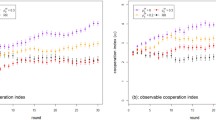Abstract
An objective of multi-agent systems is to build robust intelligent systems capable of existing in complex environments. These systems are often characterised as being uncertain and open to change which make such systems far more difficult to design and understand. Some of this uncertainty and change occurs in open agent environments where agents can freely enter and exit the system. In this paper we will examine this form of population change in a game theoretic setting. These simulations involve studying population change through a number of alternative viscosity models. The simulations will examine two possible trust models. All our simulations will use a simple choice and refusal game environment within which agents may freely choose with which of their peers to interact.
Similar content being viewed by others
Abbreviations
- PD:
-
Prisoner’s dilemma
- IPD:
-
Iterated prisoner’s Dilemma
References
Axelrod R (1984). The evolution of cooperation. Basic Books, New York
Hoffmann R (2000) Twenty years on: The evolution of cooperation revisited. Artif Soci Social Simulat 3:(2)
Howley E, O’Riordan C (2005) The emergence of cooperation among agents using simple fixed bias tagging. In: Proceedings of the 2005 congress on evolutionary computation (IEEE CEC’05). vol. 2. IEEE Press, pp 1011–1016
Howley E, O’Riordan C (2006) The effects and evolution of implicit trust in populations playing the iterated prisoner’s dilemma. In: Proceedings of the 2006 congress on evolutionary computation (IEEE CEC’06) held as part of the IEEE world congress on computational intelligence (IEEE WCCI’06). IEEE Press
Lerman K, Galstyan A (2003) Agent memory and adaptation in multi-agent systems. In: AAMAS ’03: Proceedings of the second international joint conference on autonomous agents and multiagent systems. pp 797–803, ACM Press New York, NY, USA
Marsh S (1994) Trust in distributed artificial intelligence. In: MAAMAW ’92: selected papers from the 4th european workshop on modelling autonomous agents in a multi-agent world, artificial social systems. Springer-Verlag, pp 94–112. London, UK
Marshall JA and Rowe JE (2003). Viscous populations and their support for reciprocal cooperation. Artif Life 9(3): 327–334
Nowak M and May R (1993). The spatial dilemmas of evolution. Int J Bifurcat Chaos 3: 35–78
Nowak M and Sigmund K (1990). The evolution of stochastic strategies in the prisoner’s dilemma. Acta Appl Math 20: 247–265
Riolo R (1997) The effects and evolution of tag-mediated selection of partners in populations playing the iterated prisoner’s dilemma. In: ICGA. pp 378–385
Smith M (1982). The evolution and the theory of games. Cambridge University Press, Cambridge
Stanley EA, Ashlock D, Smucker MD (1995) Iterated prisoner’s dilemma with choice and refusal of partners: evolutionary results. In: ECAL. pp 490–502
Author information
Authors and Affiliations
Corresponding author
Rights and permissions
About this article
Cite this article
Howley, E., O’Riordan, C. The effects of viscosity in choice and refusal IPD environments. Artif Intell Rev 26, 103–114 (2006). https://doi.org/10.1007/s10462-007-9039-0
Received:
Revised:
Published:
Issue Date:
DOI: https://doi.org/10.1007/s10462-007-9039-0




